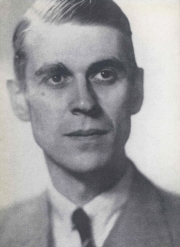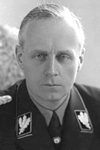I Was There! - I Lived Under Nazi Rule in Jersey
The War Illustrated, Volume 3, No. 62, Page 501, November 8, 1940.
We have already published an eye-witness account of the seizure of Jersey by the Germans (see page 51, Vol. 3). Mr. George Turner, a Jersey tomato-grower, remained on the island for more than three months before escaping to England, where he told the following story of the life of the islanders under Nazi rule.
About 300 Germans were the first to arrive in Jersey. I went on with my work until two of them came and wanted to know whether my house was my property. They went in, opened drawers and took £63, saying I would get a receipt and would be give full marks to that value. When I went to an office in the town I got nothing.
The Germans were quite nice and courteous and did not lay a finger on me, but the next morning three more arrived, picked all my fruit and tomatoes and took them away.
I asked them about the money and they said "That will be all right." I never received anything.
I cannot say that they looted. It was all done by the officials in a very courteous way. They took all the flour in the island and commandeered the hotels, billeted themselves there and emptied the cellars.
They went straight to the town hall and interviewed Mr. John Pinel, the police magistrate. They appointed about 40 town guards, who patrolled the streets in couples, usurping the police force.
Although they are what might be termed tolerant they let you know that they are the bosses. If anyone carries a case he is stopped and made to show what is inside. If the Germans see anyone hanging about they put them to work on the fields.
There is nothing Prussian about their manner, but they said to us, "You will all be Prussians from now on and the Channel Islands belong to Germany for ever. They boats will come here now from Hamburg instead of from England, and if you want to go away you will go to Germany because you are German subjects now. Germany is a very good place, and England does not know how to govern." They also told us that Ribbentrop would be the boss for Germany in England.
They took the food from the boarding houses, went into the largest grocers' warehouse and packed great crates and sent them away. From the large drapers they sent all the women's lingerie away, and helped themselves from the jewellers.
Wireless is not allowed, and there is a curfew at 10 p.m. The banks are closed, and there are no cinemas.
The bread we had was dark brown. We had no sweetstuffs, no sugar, no butter, but a bit of margarine. When the German soldiers came they were ravenous, and the first thing they did was to have a good feed. Strangely, they never took the tobacco.
Describing his escape, Mr. Turner said:
One day four of us met in a hotel, and one man said, "I am going to make a bolt for it. There is a boat in the harbour."
This boat was captained by an Irishman, and he had been there for a long time. He was not allowed to move, but he had coal in his bunkers. He said he would take us to England for £3 5s. a head. Eventually nine of us, including a girl, made our way to the boat at 9 o'clock one night.
We all went to the quay by different routes, and I hid a small suitcase under my coat whenever I passed German soldiers.
About 4 a.m. the ship glided around the headland and we were away. In three days we reached England. – "News Chronicle"
Previous and next article from I Was There!
I Was There! - How We Saved Our Burning 'Plane
The official story of the heroic feat over Antwerp which won eighteen-year-old Sergeant Hannah of the R.A.F. his V.C. is given opposite. Here is his own account of the incident, making light both of h
I Was There! - Our Skipper Proved 'As Cool as Ice'
The heroism of some of the seamen in the convoys was recognized on October 29, when decorations were awarded to them. The story that led to the granting of the M.B.E. to Captain W. H. Dawson, whose sh
Index
Previous article
Retribution
And shall he live? Who feared to meet a worthy foe And sought the weak to overthrown? Who wasted, pillaged, plundered, slew, And proved his bonded word untrue? Whose ears were deaf and eyes were
Next article
The Animals in the Zoo Don't Mind the Raids
The Zoo in Regent's Park is not only one of the favourite resorts of Londoners but a national institution. Hence this account, reprinted by permission from "The Times", of how it is faring during the





